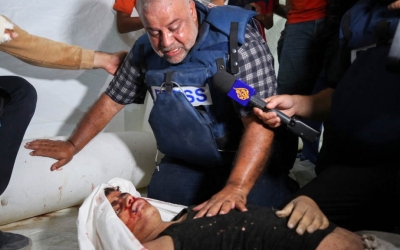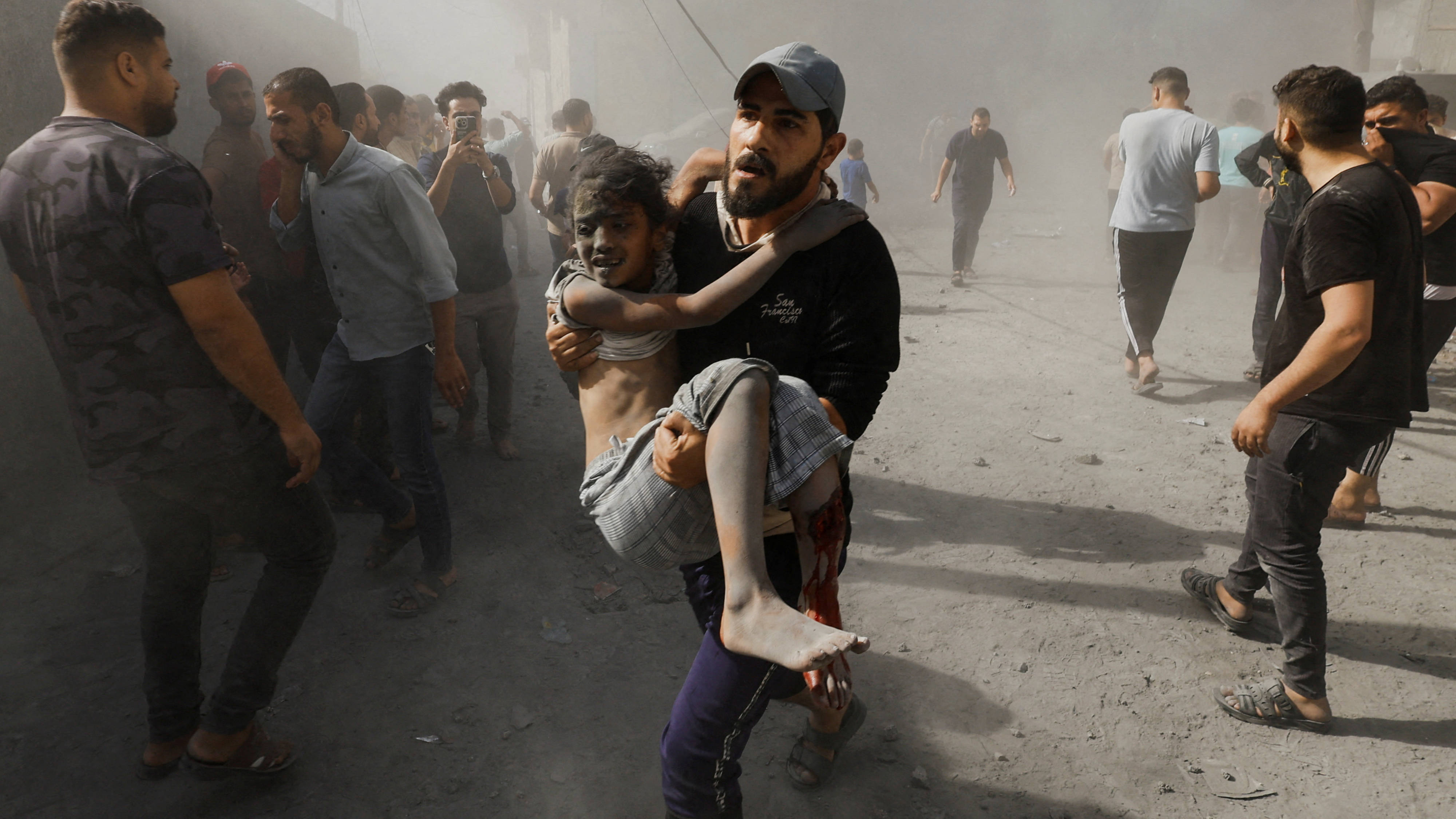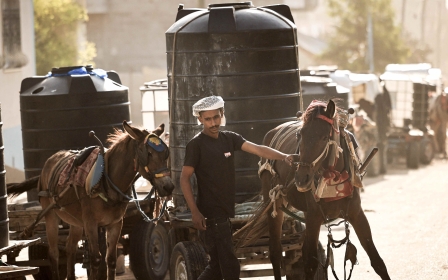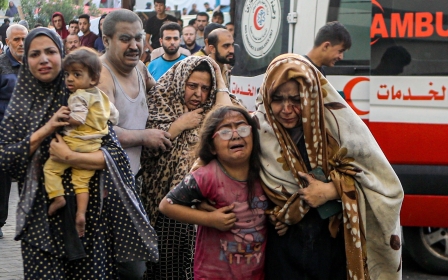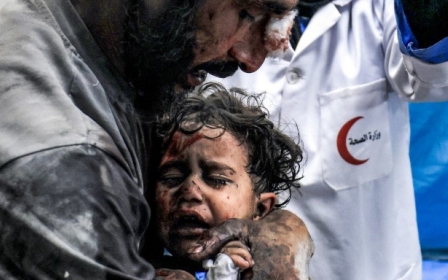Israel-Palestine war: In their pursuit of the truth, Gaza's journalists risk everything
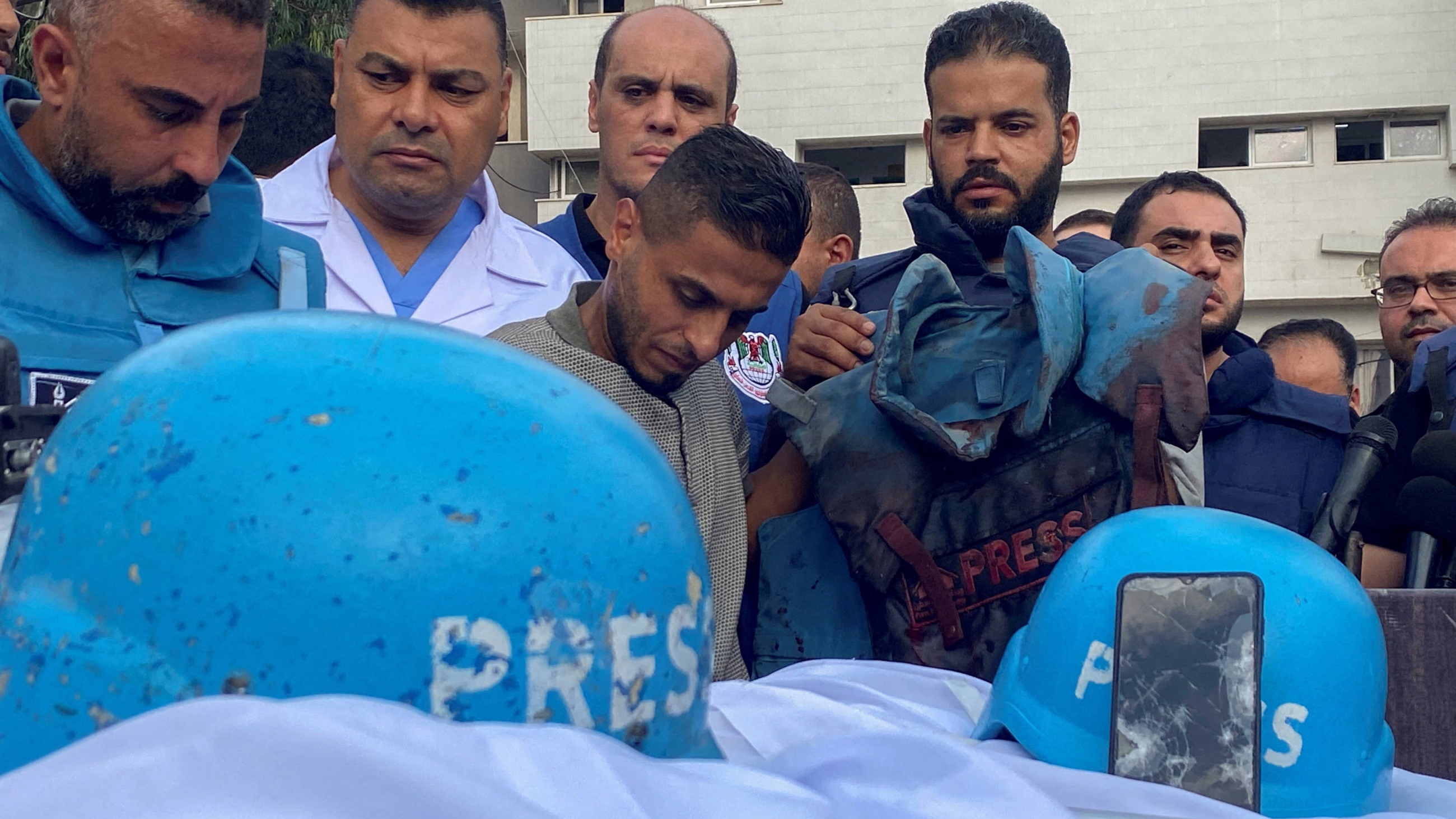
In the heart of the Gaza Strip, amid the constant drone of bombing and the harrowing tales of loss, a group of journalists stand undeterred, documenting the daily horrors of a conflict that shows no sign of abating.
For Youssef al-Saifi, a dedicated cameraman for Al-Arabi TV, his coverage of Israel’s ongoing war on Gaza has not been like any other he has faced.
This war has brought destruction closer to him than ever before - robbing him of his family home and the haven he had sought during exhaustive coverage hours.
The Israeli air strikes destroyed the four walls that housed Youssef's childhood memories. The place that once held the aroma of home-cooked meals, the echoes of family laughter, now lies buried under rubble.
With the area surrounding his home in Tel al-Hawa, south of Gaza City, subjected to constant carpet bombing, he couldn't salvage even a fragment of his past.
New MEE newsletter: Jerusalem Dispatch
Sign up to get the latest insights and analysis on Israel-Palestine, alongside Turkey Unpacked and other MEE newsletters
Amid all that destruction, Saifi is gripped with anxiety.
“I’ve transported my family to a place, and I don’t know if they will be safe or not,” he says.
Fear and uncertainty gnaw at him, pulling his focus away from work. Meanwhile, the loss of his journalism equipment, all trapped under the debris of his home, has added to his mounting challenges.
A new, chilling fear has begun taking root among journalists, he says.
The deliberate targeting of their homes - a tragedy recently experienced by veteran Al Jazeera journalist Wael al-Dahdouh, whose family was killed in an Israeli bombing - and the death of their colleagues while covering the war have instilled a paralysing dread in their hearts.
Saifi himself lost his friend Saeed al-Taweel, who was killed with two other journalists on 10 October.
At least 26 Palestinian journalists are among the 8,525 people killed in Gaza since 7 October. Israel has relentlessly bombed Gaza since Hamas conducted an unprecedented attack on southern Israeli towns. Around 1,400 Israelis were killed and more than 200 people were taken hostage.
In over three weeks of Israel's most violent bombing campaign on the besieged enclave, Gaza’s journalists find themselves grappling with an ethical dilemma: to report the truth and risk personal harm or to self-censor for safety's sake.
But nowhere is safe in the besieged enclave.
Brush with death
In one heart-stopping incident, Saifi and a colleague narrowly escaped death while driving a car clearly marked with the word “press”.
“The bombings were tens of metres away from our car,” an incredulous Saifi says.
Miraculously, they lived to tell the story. But another brush with death awaited Saifi on Monday.
Follow Middle East Eye's live coverage for the latest on the Israel-Palestine war
While driving in Gaza City, Saifi noticed a tank stealthily positioned behind a building, at Netzarim junction, moving its barrel towards a car attempting to drive away.
A moment later, right in front of his eyes, the tank fired and hit the vehicle, which was carrying four civilians.
Overwhelmed with fear, Saifi sped in the opposite direction, crying out warnings to oncoming vehicles. It was then that he saw a shell hitting the ground behind a bus carrying 30 passengers.
The news that day came as a shock to the enclave's residents - Israeli tanks have infiltrated and moved into eastern Gaza, reaching the Salah al-Din highway, cutting Gaza City and the north from the rest of the Strip.
'The most terrifying moment'
Raed Lafi, a 48-year-old freelance journalist, describes his daily routine as filled with the echoing sounds of blasts, using rubble as makeshift shields, and the frequent dial tones of his phone.
Like around one million citizens in Gaza, Lafi, who works with several Arab news agencies, was forced to comply with the Israeli army's warnings to leave Gaza City along with his family or risk being bombed.
'The basics of journalistic safety gear elude me. And moving around has become a huge risk, given the reports of vehicles being targeted'
- Raed Lafi, journalist
The family made the risky journey to seek refuge in a friend's house located in Rafah City, in the southern Gaza Strip.
"The army has the coordinates of my friend’s house," he says with a hint of relief.
His friend is a journalist working for an international news agency - such affiliations often carry a protective shield, ensuring the safety of their staff and their families, at least in theory.
But the morning of a fateful Monday shattered all illusions of safety.
Around 6am, on 23 October, without prior warning, an air strike decimated the house next door to the al-Khateeb family, with whom Lafi was staying, killing seven civilians.
"The house was only partly spared," recalls Lafi, "I found myself wounded, just a short 10 minutes before I was scheduled to go live on the Alhurra TV Channel."
In a display of unparalleled dedication, Lafi chose to narrate his ordeal on air, bloodied and battered.
"The urgency of the moment didn’t allow me a trip to the hospital. Compared to many others in Rafah, who either lost their lives or suffered severe injuries, my injury seemed minor," he says.
Lafi recounts, visibly shaken, "The most terrifying moment was when piles of rocks zipped through the very window beneath which I was sleeping. An instinctual shift of mere seconds probably saved my life."
After the blast, he shouted to his wife, telling her to check on their two daughters and not to come to his aid as he thought he was buried alive - echoing the tens of testimonies he has heard since the war began.
Personal traumas aside, what haunts Lafi the most is the heavy toll the war is increasingly having on his colleagues.
"To think that Israel could be targeting journalists is horrifying," he says.
Memories of fellow reporters who have faced fatal consequences merely for performing their professional duties in Gaza are a stark reminder of the risks they undertake daily.
With Gaza’s infrastructure in disarray, Lafi, like the rest of the journalists, battles additional challenges.
"I scramble for electricity to keep my phones charged, relying on the house's limited solar capacity. The basics of journalistic safety gear elude me. And even moving around becomes a huge risk, given the reports of moving vehicles being targeted," he says.
Heart-wrenching stories
Lafi's sentiment is amplified by Hisham Zaqut, an Al Jazeera correspondent.
“The bombing on the Gaza Strip is unrestrained,” Zaqut says.
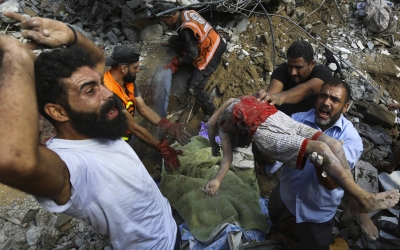
Hospitals, markets, bakeries - no place is safe. And journalists, he says, are deliberately targeted.
This has been evident from the attacks on locations where journalists congregate, including residential complexes.
The stories of journalists Jamal al-Faqawi, Wael al-Dahdouh, and Khaled al-Ashqar are particularly heart-wrenching - they all lost family members to the air strikes.
Reporter Shorouk Shaheen delves deeper into the distressing reality of journalists.
Shaheen believes the blatant assaults on media crews is a strategy that mirrors the onslaught on other essential services in Gaza.
“There’s a disturbing similarity between the treatment meted out to press crews and the attacks on our medical teams, paramedics and rescue workers,” Shaheen says.
To her, the intention behind such targeting is clear – it's an attempt to blind the world and muzzle the voices chronicling the heinous atrocities of Israel in Gaza.
This article is available in French on Middle East Eye French edition.
Middle East Eye delivers independent and unrivalled coverage and analysis of the Middle East, North Africa and beyond. To learn more about republishing this content and the associated fees, please fill out this form. More about MEE can be found here.


